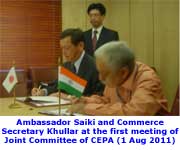and the first meeting of the Joint Committee

Japan and India signed the Comprehensive Economic Partnership Agreement (CEPA) on 16th February 2011 in Tokyo. After the completion of the respective necessary legal procedures, the Agreement entered into force on 1st August 2011.
The first meeting of the Joint Committee established under the Agreement was held on 1st August 2011 in Delhi. At this meeting, co-chaired by Ambassador Akitaka Saiki (Japanese side) and Dr. Rahul Khullar, Commerce Secretary (Indian side), the Joint Committee made the decisions necessary for the implementation of the Agreement, such as the Operational Procedures. It is expected that this Agreement will promote the liberalization and facilitation of trade as well as investment between the two countries and will further strengthen their economic ties in wide-ranging fields.
$7 trillion CEPA
This CEPA is significant in terms of the sizable GDP of India and Japan. For India, this agreement provides access to the Japanese market with 5 trillion US dollars GDP, and is also the first CEPA with a developed country. For Japanese companies, it is expected to provide more business opportunities in India, which is one of the growth engines in the world.
Trade in Goods
About 94% of the tariffs between Japan and India will be eliminated within 10 years (about 97% by Japan and about 90% by India) on a trade value basis. Japan agreed to eliminate almost all the tariffs on industrial products at the entering into force of this Agreement and also made commitments on agricultural products as below.
Chart (pdf, 316kb)
Comprehensive package ・・ New level of Strategic and Global Partnership
(Investment)
The number of Japanese companies operating in India has doubled in the last 3 years from 362 in February 2007 to 725 in October 2010. Japan’s FDI was more than 800 billion yen in the year 2008. These investments are contributing towards expansion of employment, technical transfer, and export of Indian goods.
The Japan-India CEPA contains Chapters on “Investment”, “Trade in Services”, “Intellectual Property”, “Improvement of Business Environment”, and so on. Those Chapters may enhance investment activities of both businesses.
(Generic medicine)
India is the first CEPA partner of Japan with whom Japan has agreed to commit on the approval procedure of Generic medicine. Japan will provide “National Treatment” to the Indians for the application of approvals for release of generic medicine, and complete the procedures within a reasonable period of time.
(Movement of Natural Persons)
CEPA plays an important role to increase the movement of the people between the two countries. Japan offered a special commitment on entry and temporary stay for Indian Instructors of (i) Indian Yoga, (ii) Indian cuisine, (iii) Indian classical music and dance, and (iv) English language.
Under CEPA, Japan and India also agreed to enter into negotiations on a Social Security Agreement in order to complete the consultations and negotiations within 36 months after the commencement of the consultations, which took place in January 2011. The first round of negotiations was held last week between 25 -29 July in Tokyo which contributed significantly towards the conclusion of the negotiation.
Outline of the India-Japan CEPA (pdf, 516kb)